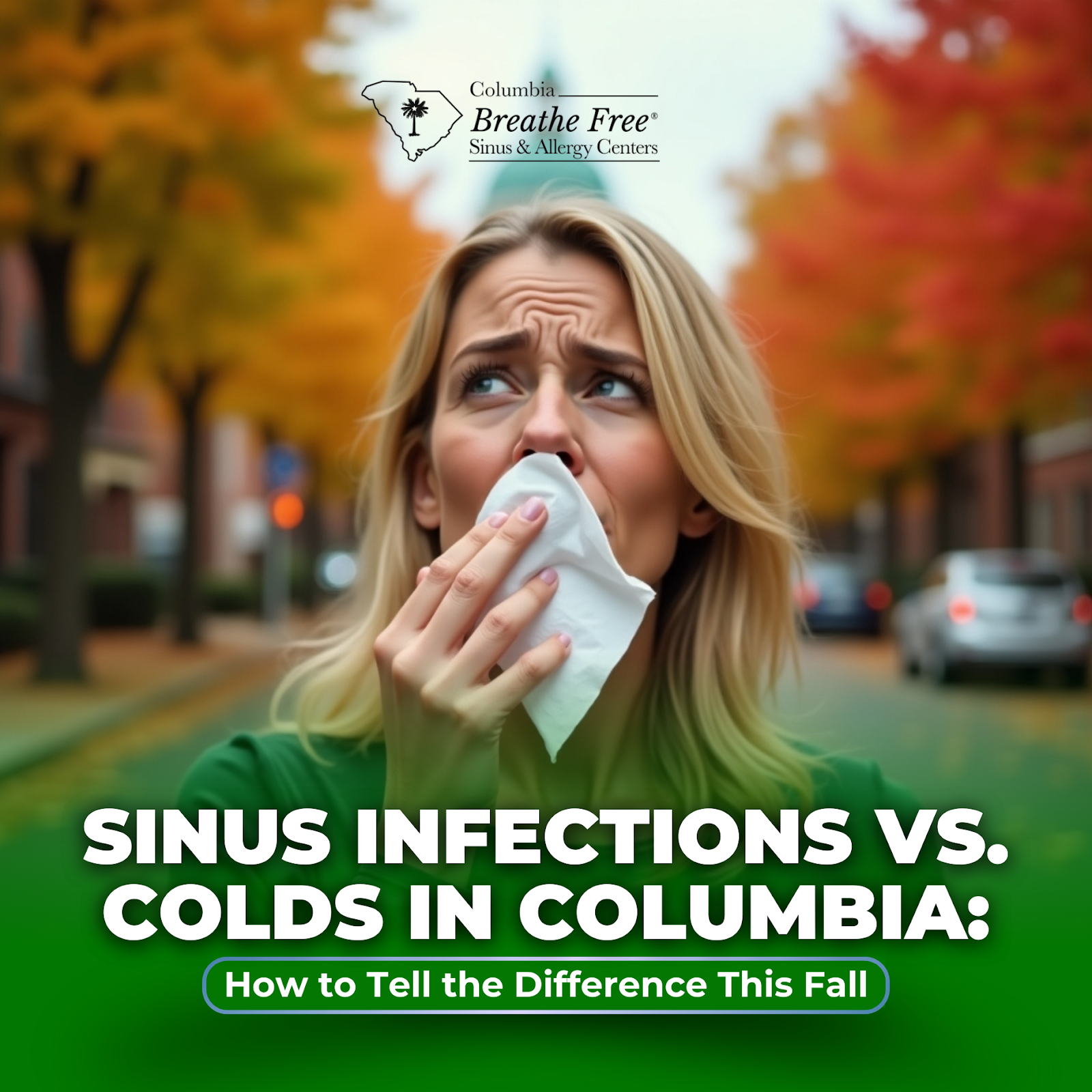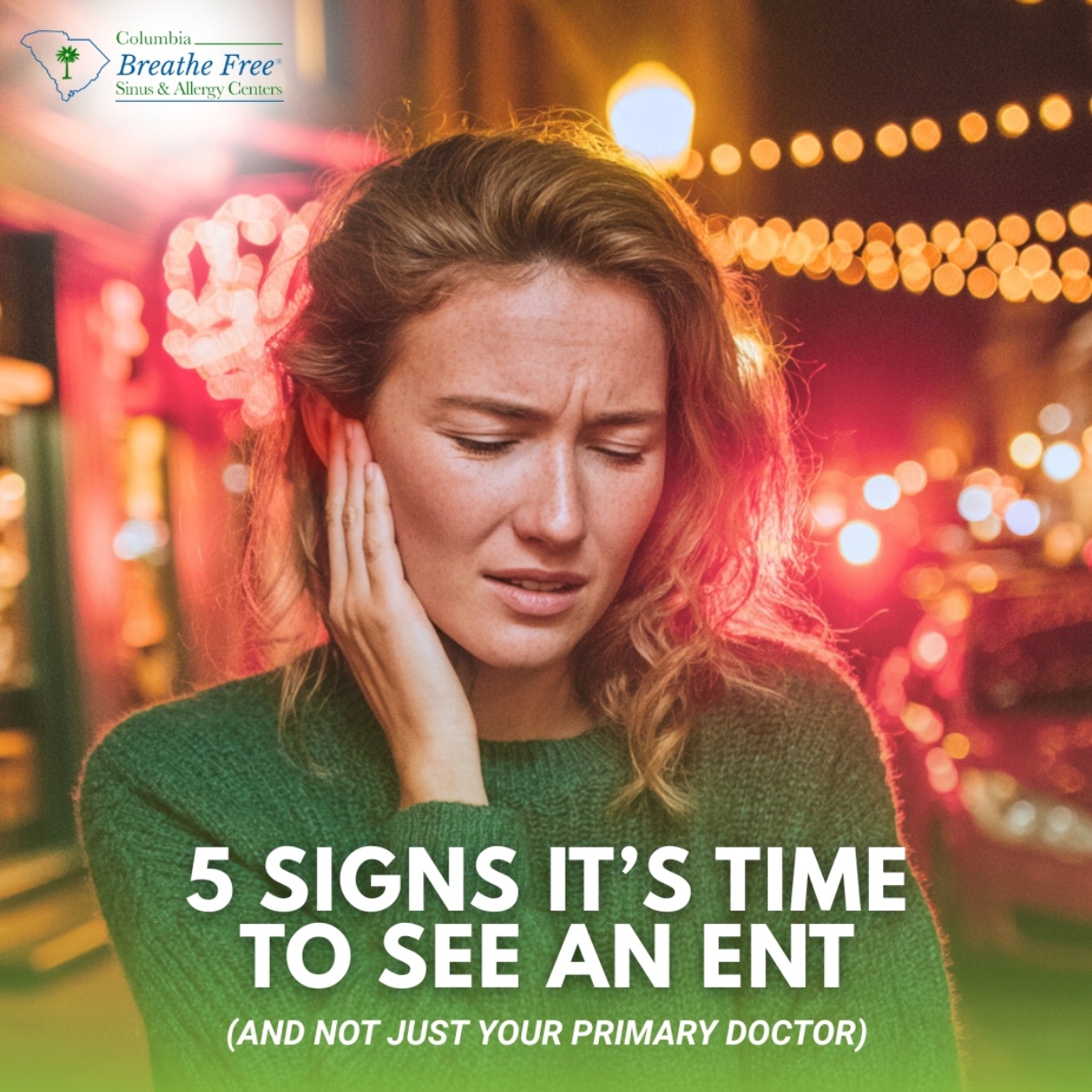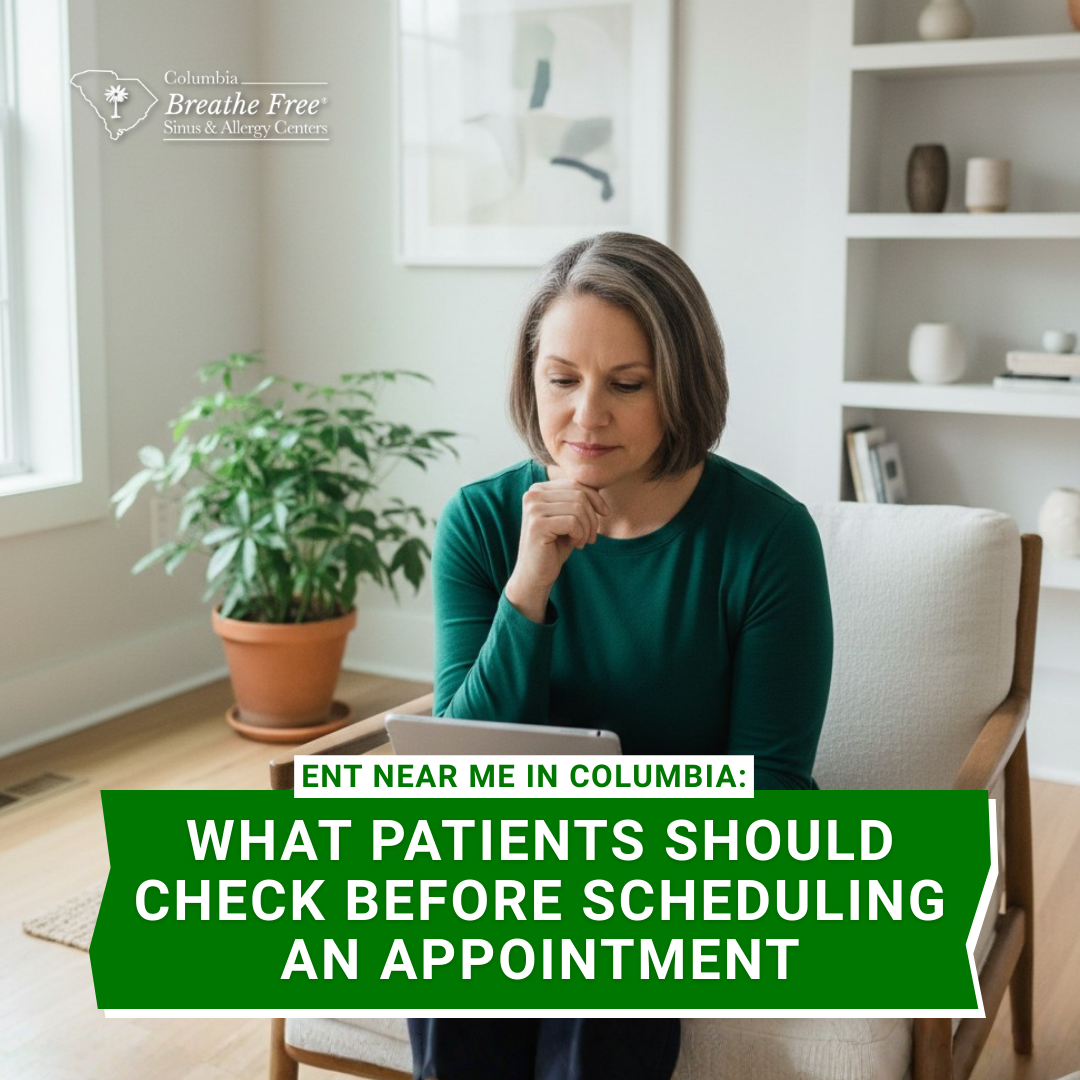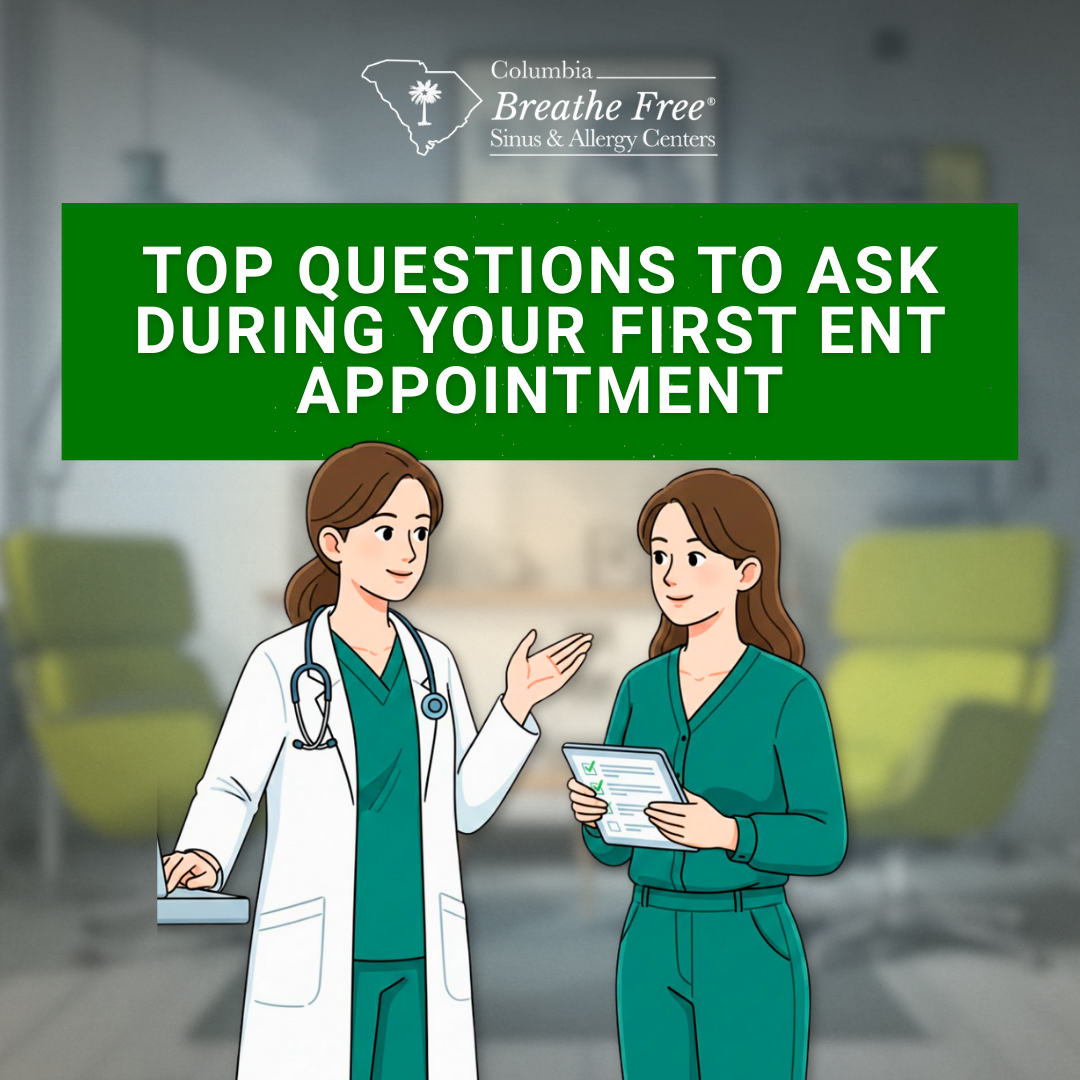.png)
Sinus Infections vs. Colds in Columbia: How to Tell the Difference This Fall
Fall in Columbia often brings an increase in both colds and sinus infections. Because the two share many overlapping symptoms, it can be challenging to know which one you’re dealing with.
Understanding the difference is important, since recognizing whether it’s a cold or a sinus infection can guide you toward the most appropriate care and may help improve your breathing and overall comfort.
Here’s what you need to know about how the two conditions differ.

What Is the Common Cold?
The common cold is a contagious viral infection in the upper respiratory tract, affecting the nose and throat. The infection can easily spread through sneezing, coughing, or even by just touching contaminated surfaces. It can especially easily spread in crowded spaces like schools, workplaces, or public transportation.
Symptoms of the common cold include:
- Runny nose with watery, thin, and clear nasal discharge
- Stuffy nose
- Sneezing
- Cough
- Sore or irritated throat
- Mild headaches
- Fatigue
- Body aches
- Low-grade fever, in some cases
Cold symptoms are mild and usually resolve within seven to ten days, although symptoms like coughing and fatigue may last longer.
What Is a Sinus Infection?
A sinus infection, or sinusitis, is a common respiratory condition that affects millions of people in the United States alone. It is characterized by the irritation, inflammation, or swelling of the sinus cavities. This inflammation can block normal mucus flow and drainage, making it easier for germs to build up and potentially lead to infection.
Common symptoms of sinusitis include:
- Nasal congestion
- Stuffy nose
- Runny nose with thick green or yellow mucus discharge
- Postnasal drip
- Facial pain and pressure, particularly around the nose, eyes, cheeks, and forehead
- Ear pain
- Toothache
- Headache
- Cough
- Fever
- Fatigue
- A loss or reduced sense of taste or smell
- Bad breath
Unlike the common cold, sinusitis symptoms can last for weeks or longer. A sinus infection that lasts for longer than 12 weeks without any signs of getting better becomes what is known as chronic sinusitis.
Cold vs. Sinus Infection: Telling the Difference
Here’s how one can tell the difference between the common cold and a sinus infection:
🕜Duration of symptoms
Common cold: 7 to 10 days
Sinusitis: More than 10 days, lasting several weeks
🤧Nasal discharge
Common cold: Watery, clear, and thin
Sinusitis: Thick yellow or green
🤕Facial pain and pressure
Common cold: Rare, mild if any
Sinusitis: Common, can be severe
💆Headache
Common cold: Common, but generally mild
Sinusitis: Common, generally severe
🤒Fever
Common cold: Less common, mild if any
Sinusitis: More common, more severe
🥱Fatigue
Common cold: Generally mild
Sinusitis: Can last longer and be more severe
🍽️Smell and taste
Common cold: Unchanged or, in some cases, slightly reduced
Sinusitis: More common and significantly reduced
When to See an ENT in Columbia for Expert Evaluation
While many colds and mild sinus infections can be managed at home, it’s a good idea to see an ENT specialist for a professional evaluation if:
- Your symptoms last for more than 10 days without any signs of improvement
- You are experiencing severe headaches or facial pain
- You have a high fever (above 101°F)
- You are experiencing symptoms like swelling around the eyes or vision changes
- You have a stiff neck
- Your symptoms are worsening after initially showing signs of improvement
Stubborn Sinus Issues? Columbia Breathe Free Can Help!
During the fall, many people in Columbia notice an uptick in colds and sinus symptoms, which can make it difficult to tell one from the other. Because the conditions often overlap, recognizing the differences is an important first step toward finding the right care and taking steps to breathe easier and feel more comfortable.
At Columbia Breathe Free, we know how disruptive persistent sinus problems can be. From sneezing and congestion to headaches and pressure, these symptoms can interfere with your comfort and daily activities.
If you’re searching for an ENT in Columbia, our team at Columbia Breathe Free is here to provide evaluation and treatment options tailored to your needs.
Schedule a consultation with us today and start your journey toward better sinus health.
Other Blogs

5 Signs It’s Time to See an ENT (and Not Just Your Primary Doctor)
If you’ve ever dealt with persistent ENT issues like chronic nasal congestion, recurring ear infections, severe sinus pain and pressure, and hearing difficulties, then you know how they may affect your daily life, productivity, and comfort, depending on their severity. Many patients today are taking a more proactive approach to their health and may choose to seek care when they notice persistent or worsening symptoms.

ENT Near Me in Columbia: What Patients Should Check Before Scheduling an Appointment
Searching for an “ENT near me” in Columbia often means you’re dealing with ongoing ear, nose, throat, allergy, or sinus concerns. This article explains what ENT providers typically evaluate and how local environmental factors may influence symptoms, along with what to expect during an ENT visit and how treatment options are commonly discussed. It also covers practical considerations before scheduling, including services offered, insurance, accessibility, and appointment availability, and highlights how Columbia Breathe Free helps patients take informed first steps toward understanding and managing persistent ENT, allergy, and sinus symptoms.

Top Questions to Ask During Your First ENT Appointment
A first visit to an ENT specialist can feel overwhelming, especially when dealing with ongoing ear, nose, or throat symptoms. This blog outlines key questions patients may consider asking during their first ENT appointment, including topics related to diagnosis, treatment options, symptom impact, and costs. It also offers practical guidance on how to prepare for an ENT visit and what to expect, helping patients in Columbia, SC make the most of their initial consultation.
The information provided in this article is for informational and educational purposes only and does not constitute medical advice. It is not intended to diagnose, treat, cure, or prevent any disease or medical condition. Always seek the guidance of your physician or other qualified healthcare provider with any questions you may have regarding a medical condition or treatment.
Results may vary: Treatment outcomes and health experiences may differ based on individual medical history, condition severity, and response to care.
Emergency Notice: If you are experiencing a medical emergency, call 911 or seek immediate medical attention.
